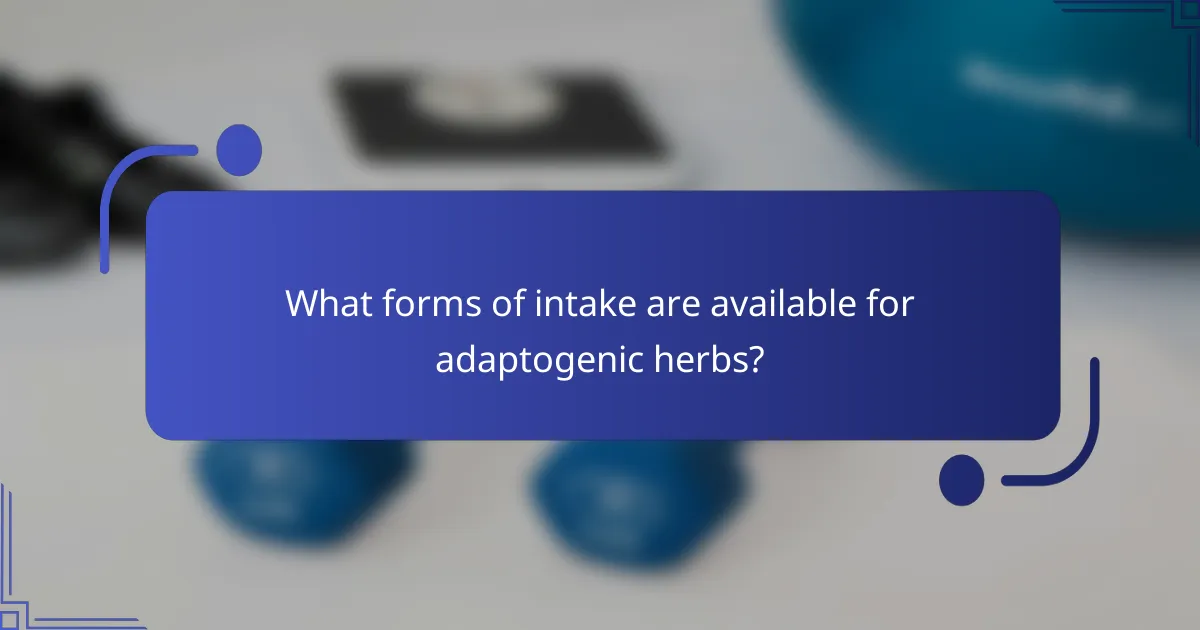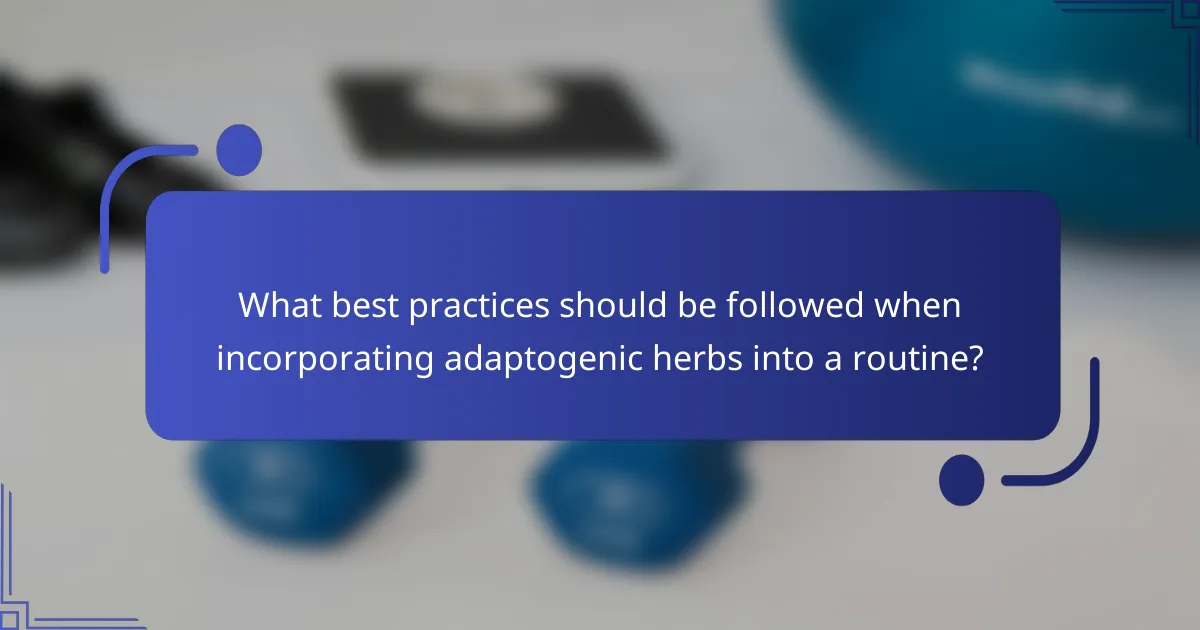Enhancing focus and mental clarity is crucial for optimal cognitive performance. Adaptogenic herbs like Rhodiola rosea and Ashwagandha regulate stress and improve cognitive function. These herbs offer benefits such as memory retention and reduced mental fatigue. Various forms of intake, from capsules to teas, provide flexibility in incorporating them into daily routines.

How do adaptogenic herbs enhance focus and mental clarity?
Adaptogenic herbs enhance focus and mental clarity by regulating stress responses and improving cognitive function. These herbs, such as Rhodiola rosea and Ashwagandha, help balance cortisol levels, which can lead to better concentration and reduced mental fatigue. Studies show that adaptogens can enhance memory retention and processing speed, making them valuable for individuals needing sustained mental performance. Additionally, their neuroprotective properties support brain health, contributing to long-term cognitive clarity.
What are the primary mechanisms of action in adaptogenic herbs?
Adaptogenic herbs enhance focus and mental clarity through various mechanisms. They regulate stress responses, modulate neurotransmitter levels, and improve blood flow to the brain. These actions help maintain cognitive function and promote mental resilience. For instance, Rhodiola rosea increases serotonin levels, while Ashwagandha reduces cortisol, providing unique benefits for mental clarity. Adaptogens also support neuroprotection, contributing to overall brain health.
Which adaptogenic herbs are most effective for improving concentration?
Adaptogenic herbs such as Rhodiola Rosea, Ashwagandha, and Ginseng are effective for improving concentration. Rhodiola Rosea enhances mental performance and reduces fatigue. Ashwagandha helps manage stress, indirectly boosting focus. Ginseng improves cognitive function and energy levels. These herbs offer unique benefits that support mental clarity and sustained attention.
How do individual responses to adaptogenic herbs vary?
Individual responses to adaptogenic herbs can vary significantly based on personal physiology, lifestyle, and specific herb properties. Factors such as dosage, duration of use, and individual health conditions influence effectiveness. For instance, some may experience enhanced focus from Rhodiola rosea, while others may find ashwagandha more beneficial for mental clarity. Genetic predispositions and existing stress levels also play crucial roles in how these herbs affect cognitive function.

What benefits do adaptogenic herbs provide beyond mental clarity?
Adaptogenic herbs provide various benefits beyond mental clarity, including stress reduction, improved energy levels, enhanced physical performance, and immune system support. These herbs, such as ashwagandha and rhodiola, help the body adapt to stressors and promote overall well-being. For instance, ashwagandha has been shown to lower cortisol levels, which can alleviate stress and anxiety. Additionally, rhodiola can enhance stamina and reduce fatigue, making it beneficial for physical activities.
How can adaptogenic herbs support stress management?
Adaptogenic herbs can significantly support stress management by enhancing focus and mental clarity. These herbs, such as ashwagandha and rhodiola, help regulate the body’s stress response and promote cognitive function. They work by balancing cortisol levels and improving resilience to stressors. Research indicates that regular intake can lead to reduced anxiety and improved mental performance.
What role do adaptogenic herbs play in overall cognitive health?
Adaptogenic herbs significantly enhance cognitive health by reducing stress and improving mental clarity. These herbs, such as Rhodiola rosea and Ashwagandha, help balance cortisol levels, which can otherwise impair cognitive functions. Research shows that adaptogens can enhance focus and memory retention, making them valuable for mental performance. For instance, Rhodiola rosea has been linked to increased attention span and improved cognitive flexibility, supporting overall brain function.

Which adaptogenic herbs are popular in different regions?
Popular adaptogenic herbs vary by region, enhancing focus and mental clarity. In Asia, ginseng supports cognitive function. In Europe, rhodiola rosea improves resilience to stress. North America favors ashwagandha for its calming effects. South America often utilizes maca root for energy and mental stamina. Africa highlights baobab for its nutrient density and cognitive benefits. Each herb offers unique attributes contributing to mental clarity.
What are the cultural uses of adaptogenic herbs in Eastern medicine?
Adaptogenic herbs are integral to Eastern medicine, enhancing focus and mental clarity. They are used in practices like Traditional Chinese Medicine and Ayurveda to promote balance and resilience.
Common adaptogens include ginseng, ashwagandha, and rhodiola. These herbs are believed to reduce stress, improve cognitive function, and support overall mental health. Research shows that ginseng can enhance mental performance, while ashwagandha helps reduce anxiety levels.
In Eastern cultures, these herbs are often incorporated into daily routines, such as teas or supplements. Their cultural significance extends to rituals and holistic health practices, emphasizing the connection between mind and body.
How are adaptogenic herbs perceived in Western wellness trends?
Adaptogenic herbs are increasingly embraced in Western wellness trends for their potential to enhance focus and mental clarity. These herbs, such as ashwagandha and rhodiola, are valued for their ability to help the body adapt to stress. Research indicates that they can improve cognitive function and reduce mental fatigue, appealing to those seeking natural alternatives for mental performance. The growing popularity reflects a shift towards holistic health practices, integrating ancient wisdom into modern lifestyles.

What forms of intake are available for adaptogenic herbs?
Adaptogenic herbs can be consumed in various forms, including capsules, powders, teas, tinctures, and extracts. Each form offers unique benefits and convenience for enhancing focus and mental clarity. Capsules provide a quick and easy intake, while powders can be added to smoothies or meals. Teas offer a soothing experience, and tinctures allow for precise dosing. Extracts often deliver concentrated benefits in smaller amounts.
How do different preparation methods affect the efficacy of adaptogenic herbs?
Different preparation methods significantly impact the efficacy of adaptogenic herbs. For instance, methods such as tinctures, powders, and teas can alter the bioavailability of active compounds.
Tinctures, which are alcohol-based extracts, often provide a concentrated dose of adaptogens. This method allows for quick absorption, enhancing focus and mental clarity. Powders, typically derived from dried herbs, may require longer digestion times but offer versatility in usage. Teas, while gentle, may extract fewer active compounds compared to tinctures.
The unique attributes of each preparation method influence their effectiveness. For example, the extraction time and temperature can affect the potency of compounds like ashwagandha’s withanolides. As a result, users may experience varying levels of mental clarity and focus based on the preparation method chosen.
What are the recommended dosages for common adaptogenic herbs?
Recommended dosages for common adaptogenic herbs vary based on the specific herb. For Rhodiola, 200-600 mg daily is typical. Ashwagandha is often taken at 300-600 mg daily. Holy Basil can be consumed in doses of 300-2000 mg daily. Ginseng generally ranges from 200-400 mg per day. Schisandra is usually dosed at 500-1500 mg daily. Each herb’s efficacy can depend on individual needs and health conditions.

Which unique attributes set certain adaptogenic herbs apart?
Certain adaptogenic herbs stand out due to their unique attributes that enhance focus and mental clarity. For instance, Rhodiola rosea is known for its ability to reduce fatigue and improve cognitive function, while Bacopa monnieri is recognized for its memory-enhancing properties. Another unique attribute can be found in Ashwagandha, which is known for its stress-reducing effects that indirectly support mental clarity. Each herb’s specific compounds and mechanisms of action contribute to its distinct benefits, making them valuable in promoting mental performance.
What rare adaptogenic herbs offer unique benefits for mental clarity?
Rare adaptogenic herbs like Rhodiola rosea and Bacopa monnieri provide unique benefits for enhancing mental clarity. Rhodiola rosea improves cognitive function by reducing fatigue and enhancing focus. Bacopa monnieri supports memory retention and processing speed, making it beneficial for learning. Other notable herbs include Ashwagandha, known for its stress-reducing properties, and Schisandra chinensis, which enhances mental endurance. These herbs offer distinct advantages that can significantly improve mental clarity and focus.
How do seasonal variations influence the potency of adaptogenic herbs?
Seasonal variations significantly influence the potency of adaptogenic herbs. Changes in temperature, humidity, and light exposure can affect the concentration of active compounds within these herbs.
For example, many adaptogens, like ashwagandha and rhodiola, may exhibit higher potency during specific growth seasons. Harvesting at the optimal time enhances their beneficial properties. Additionally, environmental stressors during certain seasons can boost the production of protective compounds in these plants, further increasing their effectiveness.
Overall, understanding these seasonal influences helps maximize the health benefits of adaptogenic herbs for enhanced focus and mental clarity.

What are the potential side effects of using adaptogenic herbs?
Potential side effects of using adaptogenic herbs can include digestive issues, headaches, and sleep disturbances. While these herbs enhance focus and mental clarity, individual reactions vary. Some may experience allergic reactions or hormonal imbalances. Consulting a healthcare professional before use is advisable to mitigate risks.
How can users identify adverse reactions to adaptogenic herbs?
Users can identify adverse reactions to adaptogenic herbs by monitoring their physical and mental responses after intake. Common signs include digestive issues, headaches, or increased anxiety. Keeping a journal to track symptoms can help correlate reactions with specific herbs. Consulting with a healthcare professional is advisable for persistent or severe reactions.
What precautions should be taken when starting adaptogenic herbs?
When starting adaptogenic herbs, consult a healthcare professional first. Monitor for side effects and start with low doses. Consider potential interactions with medications. Maintain a consistent intake schedule to gauge effects accurately. Gradually adjust doses based on individual response.

What best practices should be followed when incorporating adaptogenic herbs into a routine?
To effectively incorporate adaptogenic herbs into a routine, start with small doses and gradually increase. Monitor your body’s response to each herb. Choose high-quality sources to ensure potency and purity. Consider timing; some herbs may be more effective in the morning for focus, while others may aid relaxation in the evening. Consult a healthcare professional, especially if you have underlying health conditions or are taking medications.
How can users optimize their intake for maximum mental clarity?
To optimize intake for maximum mental clarity, incorporate adaptogenic herbs like rhodiola, ashwagandha, and ginseng. These herbs enhance focus by reducing stress and balancing cortisol levels.
Consider the following strategies for effective use:
1. **Choose the Right Form**: Use tinctures or powders for quicker absorption.
2. **Timing**: Take herbs in the morning or before mentally demanding tasks.
3. **Consistency**: Regular intake maximizes benefits; aim for daily use.
4. **Combine Wisely**: Pair with a balanced diet rich in omega-3s and antioxidants.
These approaches can significantly improve mental clarity and focus.
What common mistakes should be avoided when using adaptogenic herbs?
To maximize the benefits of adaptogenic herbs, avoid common mistakes such as incorrect dosage, choosing low-quality products, and neglecting individual reactions. These errors can diminish effectiveness and lead to adverse effects.
1. Incorrect Dosage: Taking too little may not yield benefits, while excessive amounts can cause side effects.
2. Low-Quality Products: Poor sourcing or processing can reduce potency and purity.
3. Ignoring Individual Reactions: Each person may respond differently; monitor effects closely.
4. Inconsistent Use: Regular intake is essential for optimal results; sporadic use may hinder benefits.
5. Lack of Research: Not understanding specific herbs’ properties can lead to ineffective combinations.


